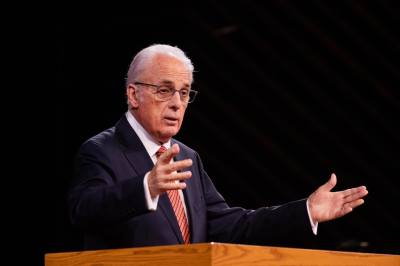What’s 5% of John MacArthur worth?

At the recent Shepherds Conference, Steve Lawson said, “I think that 5% of John MacArthur is worth more than the whole Evangelical world put together.”
Some Evangelicals immediately accused Steve Lawson of celebrity worship, idolatry and flattery.
Normally, I wouldn’t dedicate an article to this kind of issue. To be honest, I think this supposed controversy is silly. However, I’ve received some questions about this. And it actually gives me an opportunity to share something I’ve been thinking about concerning John MacArthur, Evangelicals, and North Americans.
Before I get to that, however, I’ll explain why I think this controversy is silly.
Steve Lawson didn’t say anything out of the ordinary. We’ve all said similar things, one way or another, about people we cherish. For instance, if I say 5% of my wife is worth more than all wives put together, is that flattery and idolatry?
Or would that be a merely sensational way for me to express my appreciation for my wife?
In other words, if I reference Proverbs 31:29 and say to my wife: “many women have done excellently, but you surpass them all.” Would that be idolatry?
Or when we call Charles Spurgeon the “Prince of Preachers,” is that also idolatry? Is Spurgeon really the prince of preachers? What does that suggest about other preachers? And more importantly, doesn’t that distinction only and truly belong to Jesus?
Is it therefore idolatrous to call Spurgeon the “Prince of Preachers?” Of course not! It’s not meant to be taken literally.
Speaking of Spurgeon, he once said: “Among all those who have been born of women, there has not risen a greater than John Calvin.”
Is that objectively celebrity worship, flattery, or idolatry? After all, Spurgeon seemingly forgot one person who is born of a woman: Jesus. Does that mean Spurgeon believes Calvin is actually greater than Christ? Of course not!
Obviously, Spurgeon isn’t sinless. The Bible is the standard for discerning flattery or idolatry, not Spurgeon. But it seems like some Evangelicals are nitpicking Steve Lawson’s words because he’s criticizing them and praising John MacArthur.
In case you’re wondering, I intentionally used the word “praising” to make a point (Proverbs 27:2).
Nevertheless, it’s helpful to consider what Steve Lawson actually said. He didn’t say 5% of John MacArthur is worth more than all Christians put together. He didn’t say John MacArthur’s soul is more precious to God than the souls of other saints.
He said: “I think that 5% of John MacArthur is worth more than the whole Evangelical world put together.”
I can’t speak for Steve Lawson, but it seems to me that he was speaking of Evangelical leaders who contrast John MacArthur’s courageous ministry with cowardly ministries.
That actually brings me to what I’ve been thinking about concerning John MacArthur, Evangelicals, and North Americans.
There are absolutely people who idolize John MacArthur — I know some of them. There are members of small churches who idolize their local pastors, so of course there are some people who idolize John MacArthur. As the Apostle Paul suggests in 1 Corinthians 3, some people idolized him, so it shouldn’t surprise us that some people also idolize MacArthur.
However many people, particularly Evangelicals in North America, have strong partiality against John MacArthur — I know some of them. I think this is one of the reasons why people are nitpicking Steve Lawson’s words.
If Steve Lawson was speaking about almost any other well-known pastor, I don’t think it would be controversial.
It’s interesting, many Evangelicals in Canada and America dislike John MacArthur for the same reason why Christians outside of North America love him so much.
This is what I’ve been thinking about: John MacArthur is probably the most popular Biblical pastor in the world. Why?
I’m not suggesting a pastor’s popularity is important. John MacArthur isn’t known for trying to win popularity contests. However, as someone who was born outside of North America — I’ve always been fascinated by why John MacArthur is so incomparably beloved by Christians in Africa, Asia, Eastern Europe, and Central and Southern America.
Of course, that doesn’t mean John MacArthur isn’t loved by many North American Christians. He’s one of the most respected and influential pastors for Christians in America and Canada.
However, it seems to me that a surprisingly large number of people who were born outside of North America dearly love John MacArthur. I think one of the reasons why he’s so dearly loved by Asians, Latinos, and Africans is because of his teachings against the charismatic movement and the prosperity Gospel — since they are especially popular in Asia, Southern America, and Africa.
And related to that, I think one of the reasons why he is especially dear to people like me — people who were born outside of North America — is that his plainspokenness, which is so offensive to many North Americans, is actually endearing to us.
That doesn’t mean there aren’t legitimate criticisms against MacArthur. He’s a sinner, so of course he has weaknesses in his ministry. In fact, like all of us, his greatest strength might also be his greatest weakness.
Still, his plainspoken nature is relatable to many Africans, for example, because, unlike North Americans, our cultures value plainspokenness. We don’t think vagueness is a virtue, we think it’s cowardice.
Unlike Evangelicals in North America, many Christians around the world do not think vagueness on bad theology, critical race theory, or unjust policies is valuable. That’s why many people think 5% of John MacArthur is worth so much.
Speaking of John MacArthur’s courage over unjust policies, check out this trailer for Grace Productions’ The Essential Church. The upcoming documentary covers why John MacArthur is worth so much to people in America, Canada, and around the world.
Samuel Sey is a Ghanaian-Canadian who lives in Brampton, a city just outside of Toronto. He is committed to addressing racial, cultural, and political issues with biblical theology, and always attempts to be quick to listen and slow to speak.




























